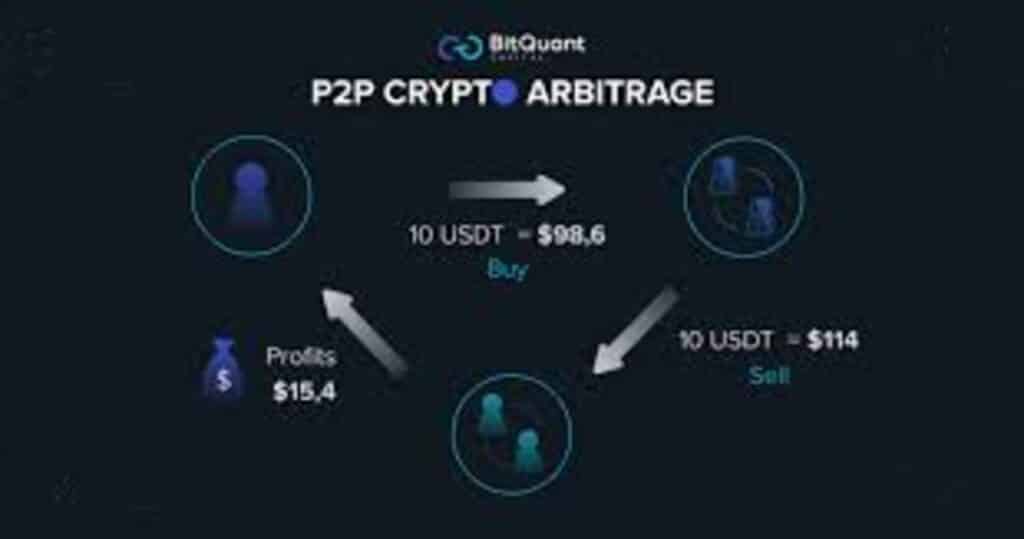P2P Arbitrage: The Best Powerful Profit in the Peer-to-Peer Economy

P2P Arbitrage Peer-to-peer (P2P) arbitrage is rapidly gaining popularity in the global financial ecosystem. As more people become interested in cryptocurrencies and decentralized markets, P2P arbitrage has emerged as a lucrative way to earn profits through price differences across multiple platforms or markets. This guide will provide a detailed and comprehensive look into P2P arbitrage, covering key concepts, strategies, and risks associated with this powerful trading approach.
What is P2P Arbitrage?
P2P arbitrage refers to the practice of buying and selling assets—typically digital currencies—across different peer-to-peer platforms to profit from discrepancies in their prices. In the P2P ecosystem, traders can engage directly with buyers and sellers without the need for intermediaries like banks or brokers. This setup often results in price differences, even for the same asset, between different markets.
For example, Bitcoin might be sold at a lower price on one platform and at a higher price on another. A trader could buy it on the cheaper platform and sell it on the more expensive one, earning a profit through this arbitrage opportunity.
How Does P2P Arbitrage Work?

The fundamental principle of P2P arbitrage lies in the price discrepancies between different markets or exchanges. These differences could arise due to a variety of factors, such as market demand, liquidity, regional restrictions, and the transaction speed on different platforms.
Here’s a step-by-step overview of how a typical P2P arbitrage process works:
- Market Research: Traders identify platforms where the price difference between assets like Bitcoin or Ethereum is significant.
- Platform Registration: Accounts are created on multiple P2P platforms to access various markets.
- Buy Low: The trader buys the digital currency at the platform with the lower price.
- Sell High: The trader then sells the same asset at the platform offering a higher price.
- Transaction Settlement: Profits are secured after successfully completing both buy and then sell transactions.
Key P2P Platforms for Arbitrage
Several platforms offer P2P trading services where arbitrage opportunities can be found. Here are some of the most popular P2P exchanges:
- Binance P2P: One of the largest cryptocurrency exchanges globally, Binance has a dedicated P2P platform that supports a wide range of fiat currencies.
- Paxful: This platform focuses on Bitcoin transactions but also supports Tether and then Ethereum. Its extensive payment options make it ideal for traders looking for price differences across regions.
- LocalBitcoins: A pioneer in the P2P trading space, LocalBitcoins offers one of the most established marketplaces for buying and selling Bitcoin.
Benefits of P2P Arbitrage
P2P arbitrage offers several advantages that make it an attractive option for both novice and then experienced traders. Some of these benefits include:
1. Direct Access to Global Markets
Unlike centralized exchanges, P2P platforms offer traders direct access to a vast range of buyers and then sellers worldwide. This creates an opportunity to capitalize on price discrepancies across different geographical regions.
2. Lower Fees
With fewer intermediaries involved in the transaction process, traders can enjoy higher profit margins.
3. Variety of Payment Options
P2P exchanges offer a variety of payment methods, including bank transfers, mobile payments, and then even gift cards. This flexibility allows traders to access markets where traditional banking systems may be limited.
4. Decentralization and Anonymity
In the world of decentralized finance, P2P arbitrage provides a level of anonymity that is not always available on centralized platforms. This can be a major advantage for traders who prioritize privacy and then security.
Challenges and Risks in P2P Arbitrage
While P2P arbitrage can be highly profitable, it also comes with its share of risks. Being aware of these challenges is critical for minimizing potential losses.
1. Price Volatility
Cryptocurrency markets are notoriously volatile, and then P2P arbitrage is no exception. A delay in completing a transaction can lead to a sudden price change, affecting profitability. Traders must stay vigilant and then act quickly to take advantage of price differences.
2. Liquidity Issues
Some P2P platforms may have limited liquidity, especially for less popular cryptocurrencies. This can make it difficult to buy or sell large quantities of an asset without significantly impacting the price.
3. Transaction Delays
Since P2P trading relies on individual buyers and then sellers, there can be delays in completing transactions. This is particularly problematic when engaging in arbitrage, as market conditions can change rapidly.
4. Scams and Fraud
Due to the anonymous nature of P2P platforms, the risk of encountering fraudulent actors is higher than on traditional exchanges. Always vet your trading counterpart and then use escrow services whenever available to mitigate this risk.

Strategies for Successful P2P Arbitrage
To succeed in P2P arbitrage, traders must adopt a strategic approach. Here are some key strategies to maximize profits and reduce risks:
1. Monitor Multiple Markets
Constantly monitoring prices across various P2P platforms is essential to identify profitable arbitrage opportunities. Tools like price tracking software or exchange rate monitors can help streamline this process.
2. Leverage High Liquidity Assets
Focusing on high liquidity assets like Bitcoin or Ethereum ensures that trades can be executed quickly without significant price slippage. This is especially important in arbitrage, where time is of the essence.
3. Secure a Reliable Payment Method
Ensure that you have access to a reliable and then fast payment method. Some payment methods may take longer to process, which can affect your ability to close trades swiftly and then capitalize on price differences.
4. Stay Updated on Regional Regulations
Different countries have different regulations regarding cryptocurrency trading. Staying informed about regional policies and restrictions is crucial to avoid legal issues and then blocked transactions.
5. Use Escrow Services
Many P2P platforms offer escrow services to protect both the buyer and then seller. Using these services can significantly reduce the risk of fraud and then ensure that funds are safely transferred once both parties agree on the terms.
Conclusion
P2P arbitrage presents a distinctive and then highly profitable avenue for traders to capitalize on price discrepancies in decentralized markets. By taking advantage of the varying prices across different platforms, traders can unlock significant opportunities to generate consistent profits. However, success in P2P arbitrage requires a well-rounded approach, combining careful planning, strategic execution, and rigorous risk management.
To truly thrive in this space, traders must stay vigilant and continually monitor price fluctuations across multiple platforms. Adopting reliable tools for tracking these variations is essential for identifying. The most favorable arbitrage opportunities. Additionally, it is crucial to maintain a deep understanding of the factors that cause these price differences, such as supply-demand imbalances, regional restrictions. Then liquidity variations. With a solid comprehension of these dynamics, traders can execute their trades at the right moment, thereby maximizing profitability.
Read more: Binance SmartChain Wallet





